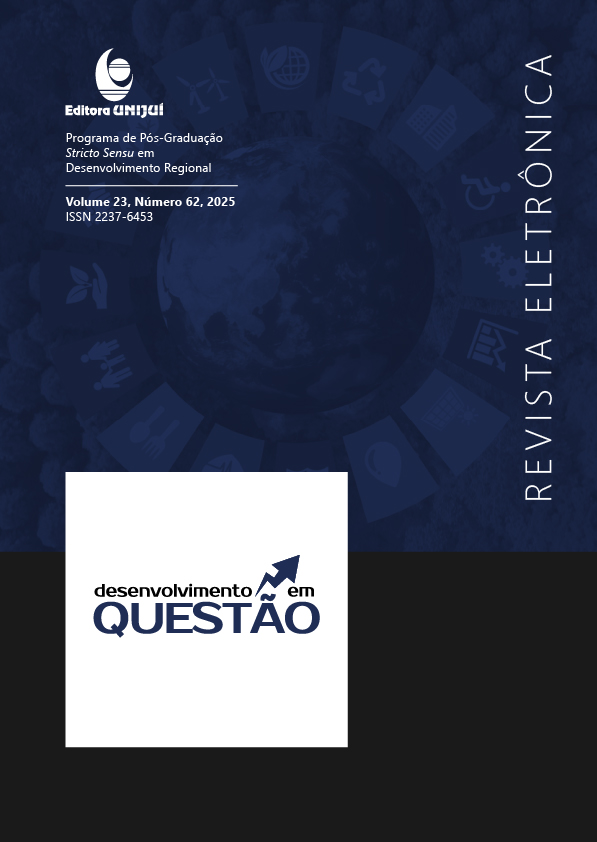Legislative challenges and the oil dystopia: Debate on the legal viability of using oil revenues to universalize basic sanitation
DOI:
https://doi.org/10.21527/2237-6453.2025.62.15987Keywords:
legal viability, oil revenues, basic sanitation, universalizationAbstract
This article focuses on the analysis of the structural trilogy of the development process of territories benefiting from oil revenues: oil revenues, intergenerational policies, and the protection of fundamental rights. The article thus examines and discusses the legal viability of using part of the resources from oil revenues (royalties and special participations) to ensure the universalization of basic sanitation, which is understood as a fundamental and essential right for structuring a holistic proposal for long-term development. To do so, the content analysis method was used to analyze legislative debates on the topic of oil revenues, focusing on their distribution and use. The results show that there is legal (technical) viability in using these resources to ensure fundamental rights, such as the universal basic sanitation, but the bottlenecks imposed by economic and political interests hinder the implementation of intergenerational policies, creating a real dystopia between large resources and the development of these territories. Therefore, structuring more participatory governance models will be important to strengthen control mechanisms and allocation of these resources to fundamental sectors of long-term territorial development.
References
BREGMAN, D. Formação, distribuição e aplicação de royalties de recursos naturais: o caso do petróleo no Brasil. 2007. 150f. Dissertação (Mestrado em Economia) – Instituto de Economia, Universidade Federal do Rio de Janeiro, Rio de Janeiro, 2007.
FERREIRA, H.R.L. A decisão do STF na ADIN nº 4917-DF e a sua influência nos direitos fundamentais e na separação dos poderes. 2023. Disponível em: http://publicadireito.com.br/artigos/?cod=e10d9154a2265dfb#:~:text=vigente%E2%80%9D%20(STF%2C-,ADI%204917%2DDF%2C%20p.,vigentes%20ao%20tempo%20da%20celebra%C3%A7%C3%A3o%E2%80%9D. Acesso em 17 de março de 2023.
GRASSI, R. & CAÇADOR, Sávio. Os impactos das participações governamentais nas finanças públicas e na economia do Espírito Santos. In: Rosélia Piquet e Rodrigo Serra (Org.). Petróleo e Região no Brasil: o desafio da abundância. Rio de Janeiro: Garamond, 2007.
MILARÉ, Édis; MILARÉ, Lucas. O Marco Regulatório do Saneamento Ambiental.
NAZARETH, P. A. In: Rosélia Piquet (org.). Norte Fluminense: uma região petrodependente. Rio de Janeiro: Telha, 2021.
NETO, J.B.O & COSTA, A. J. D. A Petrobrás e a exploração de petróleo offshore no Brasil: um approach evolucionário. Revista Brasileira de Economia. Rio de Janeiro, v.61 n 1, 95-109, Jan-Mar, 2007.
SERRA, Rodrigo. Contribuições para o debate acerca da repartição dos royalties petrolíferos no Brasil. 2005. 300f. Tese (Doutorado em Economia) – Instituto de Economia, Universidade Estadual de Campinas, Campinas /SP, 2005.
SERRA, Rodrigo. A nova/velha questão da divisão dos royalties. In: PIQUET, Rosélia. Norte Fluminense: uma região petrodependente. Rio de Janeiro, 2021.
SILVA, L. E. da & SANTANA, J. R. de & FARIAS. T. A. Impactos das rendas petrolíferas sobre os municípios: uma análise das finanças públicas e desenvolvimento em Sergipe. RDE - REVISTA DE DESENVOLVIMENTO ECONÔMICO. Salvador/BA, ano XVI nº 29, dezembro, 2014.
SILVA, Thalita Verônica Gonçalves e. O Direito Humano no acesso à água potável e ao saneamento básico – análise da posição da Corte Interamericana de Direitos Humanos. 2016. Disponível em: https://conexaoagua.mpf.mp.br/arquivos/artigos-cientificos/2016/13-o-direito-humano-de-acesso-a-agua-potavel-e-ao-saneamento-basico-analise-da-posicao-da-corte-interamericana-de-direitos-humanos.pdf. Acesso 09/05/2024.
THOMAS, J.E. Fundamentos de Engenharia de Petróleo. 2ª edição, Rio de Janeiro: Interciência, 2001.
Downloads
Published
How to Cite
Issue
Section
License
Copyright (c) 2025 Development in Question Journal

This work is licensed under a Creative Commons Attribution 4.0 International License.
By publishing in Revista Desenvolvimento em Questão, authors agree to the following terms:
All works are published under the Creative Commons Attribution 4.0 International License (CC BY 4.0), which allows:
Sharing — to copy and redistribute the material in any medium or format;
Adaptation — to remix, transform, and build upon the material for any purpose, even commercially.
These permissions are irrevocable, provided that the following terms are respected:
Attribution — authors must be properly credited, a link to the license must be provided, and any changes made must be indicated.
No additional restrictions — no legal or technological measures may be applied that legally restrict others from doing anything the license permits.
Notices:
The license does not apply to elements that are in the public domain or covered by legal exceptions.
The license does not grant all necessary rights for specific uses (e.g., image rights, privacy, or moral rights).
The journal is not responsible for the opinions expressed in the articles, which are the sole responsibility of the authors. The Editor, with the support of the Editorial Board, reserves the right to suggest or request modifications when necessary.
Only original scientific articles presenting research results of interest that have not been previously published or simultaneously submitted to another journal with the same purpose will be accepted.
Mentions of trademarks or specific products are intended solely for identification purposes and do not imply any promotional relationship by the authors or the journal.
License Agreement (for articles published from 2025 onward): Authors retain the copyright to their article and grant Revista Desenvolvimento em Questão the right of first publication.











